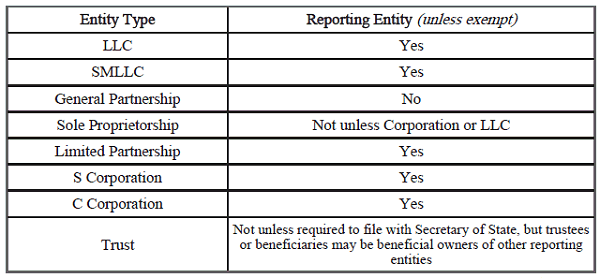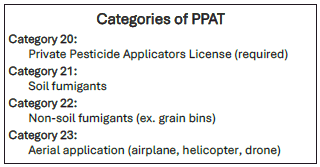

To send a message to an author, click on the author's name at the end of the article.
This Month in Ag Connection | Ag Connection - Other Issues Online
The Corporate Transparency Act (CTA), which was passed by Congress in 2020 requires non-exempted companies to report information about their companies and their beneficial owners to the Financial Crimes Enforcement Network (FinCEN) beginning in 2024. The CTA requires millions of small businesses, including small limited liability companies (LLC), corporations and limited partnerships to file beneficial ownership information (BOI) reports in 2024.
Existing entities have until January 1, 2025, to make their first beneficial ownership information (BOI) report. Entities first created or registered in 2024 will have 90 days from creation to get their first reports filed. In addition, once a reporting company has filed its first report, it must file a new report any time the reported information changes, making the prior report inaccurate. Companies have 30 days to report any changes for updates to reported information. The 30 days begins once the company becomes aware of the inaccuracy.
The CTA was enacted as part of the Anti-Money Laundering Act of 2020 in the National Defense Authorization Act for Fiscal Year 2021, Public Law 116-283. The CTA was enacted to prevent money laundering, corrupt financial transactions, and financial terrorism. It requires FinCEN, which is a bureau of the U.S. Treasury, to establish and maintain a national registry of beneficial owners of entities that are otherwise not subject to disclosure regulations.
Who needs to report? Entities created by the filing of a document with the secretary of state or any similar office under the law of a state or Indian tribe. In general, limited liability partnerships, limited liability limited partnerships, some business trusts, and most limited partnerships are also required to file reports if they are not otherwise exempt. Single-member limited liability companies (SMLLC), disregarded for tax purposes, are not generally exempt from the reporting requirements.
Who must report?

FinCEN lists 23 types of entities specifically excepted from reporting requirements. For the most part they are excluded because other laws regulate the entities separately. Entities excepted include banks, credit unions, insurance company, tax-exempt entity and more. The entire list is on the FinCEN website under the frequently asked questions.
There is an exemption for companies with 20 or more full-time U.S. employees, more than $5 million in sales, and a physical operating presence in the U.S.
The report needs to include the beneficial owners. In general, the beneficial owners are individuals who:
There are penalties for noncompliance. It is unlawful for any person to willfully provide, or attempt to provide, false or fraudulent BOI. The CTA authorizes reporting failure penalties of not more than $500 ($591 in 2024, indexed for inflation) for each day that the violation continues or has not been remedied. The statute also calls for criminal penalties of up to two years imprisonment and a $10,000 fine. In the preamble to the rule, FinCEN states that it "intends to prioritize education and outreach to ensure that all reporting companies and individuals are aware of and on notice regarding their reporting obligations."
There are court challenges going on currently, specifically National Small Business United v. Yellen. Additional challenges are pending. Will there be more clarification before the end of the year? It remains to be seen how quickly these cases will move through the court system.
Who should file the BOI report?
FinCEN has stated that anyone whom the reporting company authorizes to act on its behalf - such as an employee, owner, or third-party provider may file the report on the company's behalf. Third-party providers may include professionals who form entities for clients such as attorneys. Some non-attorney professionals may report. Individuals may report directly on the FinCEN website.
The deadline for entities formed prior to 2024 is the end of this year. Now is the time to read and learn from the websites below. Now is the time to consider who will file the report - one of the owners or a third party? If using a third-party, contact the business early since several million entities will be reporting. Will the court challenges affect reporting? It is unknown when the cases will be decided.
Resources:
Most of the content for this article came from articles published by Kristine Tidgren, attorney, Iowa State University, Center for Ag Law and Taxation https://www.calt.iastate.edu/article/beneficial-ownership-information-reporting-update
National Ag Law Center, recorded webinar with Kristine Tidgren March 2024 https://nationalaglawcenter.org/webinars/
FinCEN https://www.fincen.gov/boi (filing information, extensive FAQ and videos)
Source: Mary Sobba, Ag Business Specialist
This Month in Ag Connection | Ag Connection - Other Issues Online
Farmers who apply restricted use pesticides (RUPs) on owned property or rented property, must hold a valid Private Pesticide Applicator license to purchase, mix, and apply these products. Restricted use pesticides have been classified as such because without additional training of the applicator, these products pose a risk to humans or the environment. Proper training is essential to ensure the safety of not only the applicator, but also to protect the environment and other individuals who may come in contact with pesticides or the treated areas. All RUPs will be clearly marked with the words "RESTRICTED USE PESTICIDE" on the front panel of the label. General use pesticides do not require a license to purchase or apply unless it is being done for hire. Anyone who applies pesticides for hire, must hold a valid Commercial Pesticide Applicator license.

New rules go into effect on January 1, 2025, which impact certified pesticide applicators. The number of core competencies which must be taught to private pesticide applicators increased from five to 10. Certified private pesticide applicators may continue to operate under the current license until the expiration date listed on the license, although a few changes go into effect immediately on January 1, 2025.
A few of the significant changes are listed below.
Effective January 1, 2025, for ALL Applicators of RUPs:
Effective Upon Renewal of a Private Pesticide Applicator License:
More information can be found on Missouri Department of Agriculture's Bureau of Pesticide Control's website: https://agriculture.mo.gov/plants/pesticides/, or contact your local MU Extension Field Specialist in Agronomy.
Source: Valerie Tate, Agronomy Specialist
This Month in Ag Connection | Ag Connection - Other Issues Online
The USDA Rural Development administers an energy assistance program to help producers and business owners install or upgrade equipment and processes. The program is called Rural Energy for America Program (REAP). The REAP program was most recently authorized through the 2018 Farm Bill. This program provides guaranteed loan financing and grant funding to agriculture producers and rural small businesses to purchase or install renewable energy systems or make energy efficiency improvements. This program helps increase American energy independence by increasing the private sector supply of renewable energy and decreasing the demand for energy. These infrastructure investment lower energy costs for small businesses and agricultural producers; improve safety; and drive climate smart agriculture.
To be eligible for this program, agricultural producers must have at least 50% of gross income from agricultural operations and small businesses must be in rural, eligible areas of 50,000 people or less. Participants must also have no outstanding delinquent federal taxes, debt, judgment or debarment.
Grant and loan funds may be used for renewable energy systems, such as:
Funds may also be used for the purchase, installation and construction of energy efficiency improvements, such as:
Available funds are implemented as loan guarantees on loans up to 75% of total eligible project costs, grants for up to 50% of total eligible project costs, and combined grant and loan guarantee funding up to 75% of total eligible project costs. Rates and terms are negotiated with the lender and subject to USDA approval. There is a maximum term of 40 years.
Renewable Energy System Grant terms: $2,500 minimum and $500,000 maximum.
Energy Efficiency Grants: $1,500 minimum and $500,000 maximum.
Applicants must provide at least 50% of the project cost if applying for a grant only. Applicants must provide at least 25% of the project cost if applying for a loan, or a loan and grant combination. Projects greater than $200,000 require a technical report. Energy efficiency projects require an energy audit or assessment.
To complete an application for this program, applicants must be pre-registered with the System for Award Management (SAM) and have a Unique Entity ID (UEI) number. While there is no direct cost for this, it does take time, and this is a step which can be started before even applying. If the applicant is already registered with these systems, one would not need to register again.
Even though applications are accepted year-round, there are different deadlines for specific sources of funds. Application deadlines were on a quarterly basis in 2023 and 2024 for grants of $20,000 or less and loan/grant of $20,000 or less combination; and energy audit and renewable energy development assistance grants. Guaranteed loan applications are taken on a continuous basis.
The 2025 deadlines should be posted by USDA soon.
For questions, contact Nathan Tutt, Business Program Dir. for USDA Rural Development at (573) 876-9327. Visit the website for eligible locations and application forms (when available) at https://www.rd.usda.gov/programs-services/rural-energy-america-program-renewable-energy-systems-energy-efficiency/mo.
Source: Darla Campbell, Business & Community Specialist
Publishing Information
Ag Connection is published monthly for Northeast and Central areas of Missouri producers and is supported by the University of Missouri Extension, the Missouri Agricultural Experiment Station, and the MU College of Agriculture, Food and Natural Resources. Managing Editor: Mary Sobba.